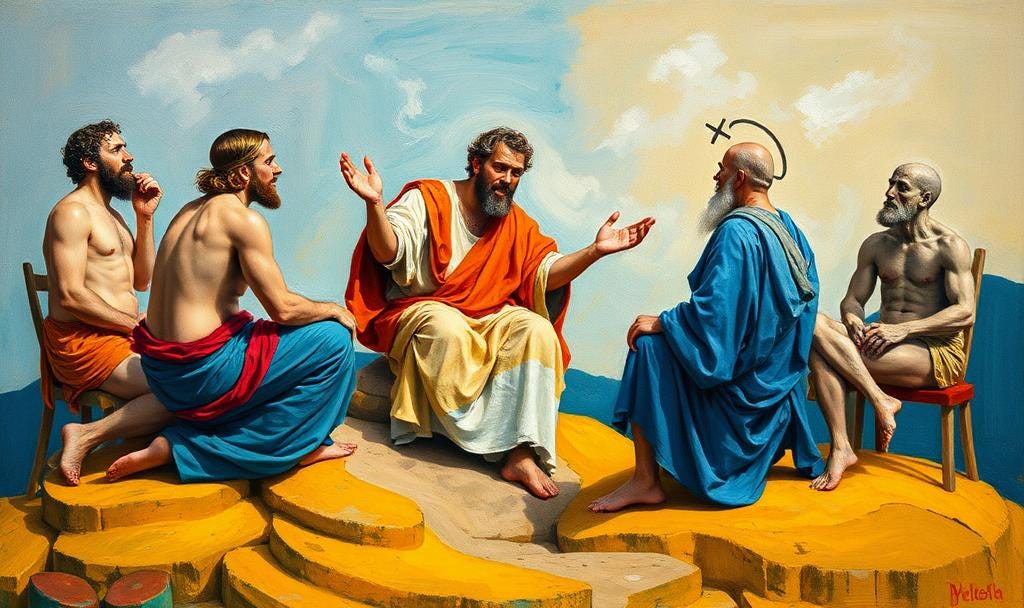On its face, “Christian philosophy” might sound silly. If you are an outsider to Christianity, you might think this is at best an expression of Christian ethical rules. Or you might be a philosopher who scoffs at there being much of a coherence to any kind of “Christian” philosophy. Or you may even think that there’s just philosophy that Christians use, and that’s all. There’s nothing in particular that makes it Christian philosophy. If you’re from within, and not a philosopher, you might think the whole enterprise of Christian philosophy is a waste of time. Either you need it to understand the Gospel or you don’t. If you don’t need it, then it’s a waste. Further, some may even think philosophy exposure makes you more likely to reject the faith altogether, and that is surely a bad result! Either way, it doesn’t look good for the Christian philosopher.
Yet there is the desire and hope that Christianity can withstand even the strongest intellectual challenges, and that philosophy can find purpose in grappling with the deep things of God. In this article I ask two primary questions: what makes philosophy “Christian”? How is it different from theology and apologetics?
1. When is Philosophy “Christian”?
In my stipulative view, a philosophy being “Christian” both has a starting point and an aim.
The Starting Point is a Christian Worldview
A Christian philosopher brings to the table a vision of objective purpose, morality, and reality, informed by biblical and natural revelation. That vision ought to include belief in God as ultimate creator, the incarnation of Christ, and the hope of resurrection. As Alvin Plantinga once said in his “Advice to Christian Philosophers”: “The Christian philosophical community quite properly starts, in philosophy, from what it believes.”
The Aim is Articulating and Defending that Vision
Philosophers tend to ask: what are the most coherent, defensible answers to life’s deepest or most important questions? A Christian thinker aims to show that the Christian worldview provides the best answers. It will explore Christian answers to those questions and implications that come from those answers. It will explore imaginative and investigative arguments that seek to bring new understanding and benefit to the Christian community and the broader world.
The Christian intellectual tradition succeeds when it treats Christianity as both truths to be believed and as a philosophical system to be scrutinized, tested, and where needed, polished.
2. How is it Different?
Not Merely a Devotional
True philosophy demands more than devotional reflection (even though this is important to the Christian life!). It requires clear definitions, logical rigor, understanding of and then grappling with objections, and engagement with implications and other models of thought. If our philosophy never interacts in the marketplace of ideas or if it backs away from counterarguments, it fails to qualify as Christian philosophy (even if it might count as “philosophical theology,” a conversation for another day).
Not Beginner’s Apologetics
Many find themselves drawn to arguments for God’s existence or popular defenses of the resurrection, which are great (and got me into philosophy!). Yet Christian-infused thought goes deeper. It also engages in philosophical questions that interest philosophers broadly and apply it to God or seek to perceive it from a Christian perspective. Apologetics might defend arguments for Christianity, but philosophy explores their foundations and implications across multiple domains. It’s deeper and not always concerned with apologetics, but with truth properly understood and explained.

3. Why Does Christian Philosophy Matter?
OK, you got a bonus question. But really: why should someone care about whether Christianity can be defended by good arguments, or what implications follow from God’s existence for Platonism, and the like?
If God is the way, the truth, and the life (cf. John 14:6), then our highest calling as philosophers and thinkers is to pursue truth in every area. It is an act of worship to do so. God is not threatened by sincere questions from believers.
Christians who have really only been around catchy slogans may fumble for a response when challenged by skeptics or even asked a difficult question by another believer. A church that builds philosophical rigor in its theological training equips its members to think well about these issues.
When informed and philosophically-trained Christian voices vanish from the public square, popular cultural debates and questions suffer. Thoughtful Christian philosophers (at all levels of experience and ability!) can model civil, constructive engagement, speaking for and with the Christian worldview.
What about the philosopher who thinks there’s just philosophy, and that’s all? I offer two responses. First, I think to a degree that is correct. To do the best philosophy and to distinguish it from mere apologetics, we must be willing to pursue the truth wherever it leads. But it would be odd to say there isn’t a particular Christian perspective, or that Christianity has nothing distinctive to say on the matter of truth. Second, the degree to which we explore what Christianity has to say in the aim of its defense or explication is a special project, and one that seems expressly Christian.
In an upcoming article, I’ll take a look at three contemporary giants of Christian philosophy: Alvin Plantinga, William Lane Craig, and Richard Swinburne. I’ll look at how Plantinga’s notion of “properly basic belief” led the faith‑versus‑reason discussion in new and interesting directions, how Craig’s re-discovery of the Kalam cosmological argument gave us a model for public philosophy, and how Swinburne’s use of probability revived classical apologetics in a philosophically rigorous form.
If you’d like to go deeper, consider subscribing for full-length essays, quarterly chats, Q&As, and Mind’s Workshop posts where I share rough drafts and sometimes mere sketches of what I’m working on, and invite your feedback.
Let me know what you’d like to see!




I forget where I heard it first, but I'm reminded of the comment I once heard about Christian music or literature, which is that "Christian" when used as an adjective often points to something that isn't very good. I've often wondered, does the modifier "Christian" add anything to "Philosophy"? I've always been of the opinion that doing philosophy correctly would inevitably lead one to become a Christian. That is just to say that the true and final view of metaphysics, epistemology, and axiology would be Christianity.
My bone to pick with Plantinga, which is related to problems with presuppositionalism, is that he suggests we should just start with the Christian worldview. Since we're talking about philosophy, wouldn't it make more sense to say that we should establish the Christian worldview through sound arguments first and then work out its philosophical ramifications? I suspect many like Plantinga may think that we can't do that (nor can anyone else justify their non-Christian worldviews), so we all have to start somewhere arbitrary, so why not start with Christianity? The reason not to go along with Plantinga here is because the prospects of philosophy arriving at the truth are not as bleak as he may presume.
Now, if all he means is don't be afraid to pursue philosophical topics, questions, and ideas that are of interest to the Christian worldview, I will agree wholeheartedly. If all he means is that we should be bold in pursuing philosophy of religion, analytic theology, and philosophical theology, then I have nothing but agreement. But I think he means more than this.
Ultimately, I have a higher view of natural theology than Plantinga and other presupps.